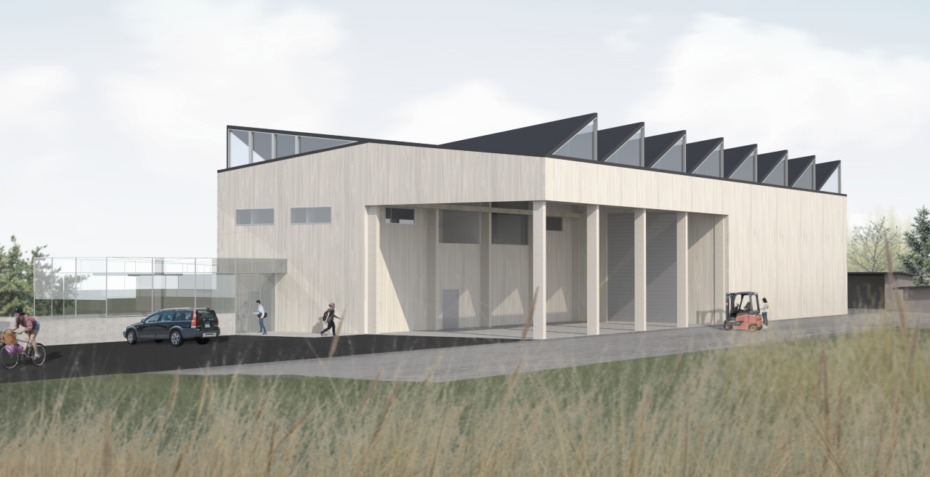
If you build it, it can contribute to a more sustainable future. That’s the aspiration behind the ambitious McGill project known as Building Architecture Research Node (BARN), which was awarded over $7.5 million through the Canada Foundation for Innovation (CFI) Innovation Fund (IF) today. With funds from the Government of Quebec, BARN will receive more than $19 million in research support.
Buildings contribute to an estimated 39 per cent of global carbon emissions not only though direct energy use, but also through the energy intensive processes used to produce construction materials such as steel, cement and glass. Alternatively, forests are natural carbon sinks, absorbing and storing atmospheric carbon.
Working with an interdisciplinary team of McGill researchers, as well as with private and public sector partners, BARN co-leads Michael Jemtrud, Kiel Moe, and Salmaan Craig (Peter Guo-hua Fu School of Architecture) aim to develop regional, carbon-negative approaches to construction, linking sustainable forestry with timber innovations.
With the goal of producing long-lived and resilient architecture, the BARN team will explore ways to “decarbonize” buildings and environments by making them less carbon-intensive to operate and by reducing the amount of carbon embodied in building materials, components, assemblies, buildings and communities.
Nine projects receive funding injection
The BARN project is among the nine McGill research projects which combined received nearly $45 million in funding through this CFI-IF competition. The Province of Quebec and other partners contribute additional funds to the projects. Collectively, the nine McGill-led projects represent a total research infrastructure investment of $110 million to McGill.
Across Canada, the investment tops $518 million in research infrastructure support through the CFI. The funding will go to 102 projects at 35 post-secondary institutions and research hospitals across the country.
“Projects funded through the Innovation Fund help McGill remain at the forefront of exploration and innovation, while making meaningful contributions to generating social, health, environmental and economic benefits and addressing global challenges,” said Martha Crago, Vice-Principal (Research and Innovation).
Fourteen other McGill researchers will collaborate on CFI projects led by other institutions including Nathalie Tufenkji of the Faculty of Engineering who will collaborate on the project, PURE: Particles in URban Environments led by Université de Montreal researcher Kevin Wilkenson; Dominic Ryan of the Faculty of Science who will collaborate with McMaster University’s Bruce Gaulin on the project, Building a Future for Canadian Neutron Scattering; and Robert Zatorre, who will collaborate with the Université de Montreal’s Simon Dalla Bella on the project, Auditory-Motor Skill Learning and Brain Plasticity. This project will also coordinate with the McGill-led NSERC-CREATE Complex Dynamics of Brain and Behaviour, led by Professor Caroline Palmer.
Timeless architecture for a sustainable future:
The showcase BARN building, to be located on McGill’s Macdonald campus, will include laboratories for an interdisciplinary team of experts in energy, ecology, landscape, forestry, architecture and construction. It will incorporate a state-of-the-art workshop for processing timber, and space for assembling and testing innovative building technologies at full scale. The Mac campus site will also enable the team to use wood harvested sustainably from the Morgan Arboretum to be processed and used in the design and construction of novel buildings in the as part of the facility’s “research-develop-demonstrate workflow,” says Jemtrud.
Jemtrud adds that the researchers will focus on two specific questions as they embark on the project: “How can we harvest and design with wood to increase the carbon sequestration from forests? And, how can we drastically cut greenhouse emissions in designing and constructing a resilient built environment?”
The large, interdisciplinary team capitalizes on the vast intellectual resources in the School of Architecture and in other Faculties and will train the next generation of professionals in carbon-neutral and climate resilient design.
Novel therapeutics for movement disorders
Another CFI Funded Project, Next Generation Dopaminergic Cell Modeling and Therapeutics for Movement Disorders, led by Carl Ernst and Edward Fon of the Faculty of Medicine and Health Sciences, seeks a major breakthrough for people suffering from movement disorders, including Parkinson’s disease (PD), as well as other neurodevelopmental, neurodegenerative, and genetic disorders. The project received more than $3.4 million from the CFI Innovation Fund. With additional funding, more than $8.5 million will be invested.
For the children and adults living with these disorders, every aspect of daily life is impacted. Another commonality of these disorders is the involvement of the dopamine system. Personalized medicine initiatives such as that led by Ernst are becoming increasingly practical, and “midbrain” dopaminergic cells derived from patients represent an otherwise inaccessible type of cell that is powerfully relevant to the original donors and their medical, genetic, and neurological condition(s).
The project will create an innovative research hub to study brain stem cells derived from individuals suffering from movement disorders to identify, validate and develop novel therapeutics most suitable to their individual genetics and cellular phenotypes. The project will develop new personalized pharmacological treatments that alleviate suffering, improve quality of life and slow or reverse disease progression.
View the full list of McGill’s 2020 CFI Innovation Fund recipients.
